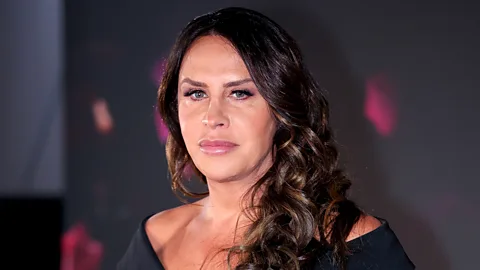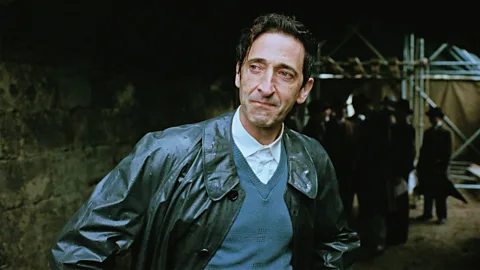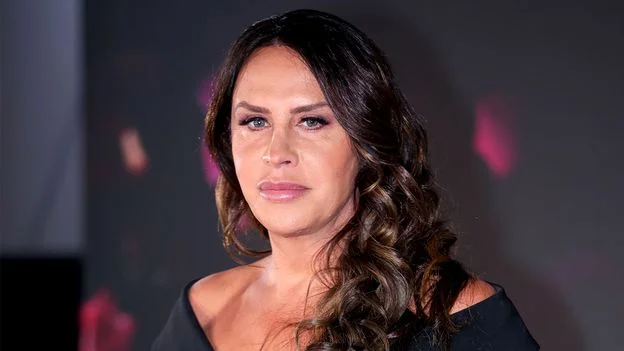 Getty Images
Getty ImagesThe unearthing of inflammatory social media remarks by the actress about subjects including George Floyd, Islam and the Oscars itself has caused a storm – and may threaten the film’s overall chances at this year’s Academy Awards.
Karla Sofía Gascón made Oscars history by being the first trans woman to be nominated in the best actress category. Up until this week, there was a chance that she might make history again by winning the award, too. But now? “I think we can safely say that Karla Sofía Gascón won’t be winning anything,” Wendy Ide, film critic of The Observer, tells the BBC.
Gascón plays a trans Mexican drug lord-turned-philanthropist in Jacques Audiard’s operatic musical-thriller, Emilia Pérez – a film that has long been one of the favourites to take home the 2025 Academy Awards’ biggest prizes, including best picture, but was already clouded in controversy. Some Mexican commentators have objected to the French writer-director’s depiction of their country, and to the paucity of Mexican talent in the production, most of which was shot near Paris. That might not have been enough to turn the Academy’s voters against Emilia Pérez, which received 13 nominations, but now there’s a bigger issue for them to consider.
 Netflix
NetflixEarlier this week, Gascón complained in an interview that the social media team working with Fernanda Torres, a best actress nominee for I’m Still Here, was “tearing me and Emilia Pérez down”. She then backtracked, claiming that she was “referencing the toxicity and violent hate speech on social media” in general. But the impression lingered that Gascón had attacked a competitor in a way that was against the spirit of the Oscars. Still, that was a storm in a teacup compared to the hurricane of old X posts that were unearthed by journalist Sarah Hagi, and subsequently reported in Variety. Posted during 2020 and 2021, they included numerous offensive remarks about George Floyd, Chinese people, Muslim women and Islam in general, to name but a few of Gascón’s targets. To top it all? A post attacking The Oscars themselves. Of the 2021 event, at which Nomadland won best picture, Gascón said: “More and more the #Oscars are looking like a ceremony for independent and protest films, I didn’t know if I was watching an Afro-Korean festival, a Black Lives Matter demonstration or the 8M [a Spanish way of referring to International Women’s Day]. Apart from that, an ugly, ugly gala.”
The irony is that, because Gascón is trans, and the film offers a sympathetic, nuanced portrayal of a trans protagonist, part of the film’s appeal to voters was that it seemed so progressive. But there is nothing progressive about the anti-diversity content of her posts. “Emilia Pérez’s chances are strongly linked to its liberal credentials,” says Ed Potton, an arts editor at The Times. “Once those are lost, they’ll be hard to regain.”
On Friday, Gascón released a statement saying that she was “deeply sorry to those I have caused pain”, but the damage is done. “She was always an outside chance for best actress,” says Ide. “But I would now be very surprised if Emilia Pérez won best picture, and this time last week it felt like a strong contender.”
As Ide says, the reverberations of Gascón’s social media posts may not just demolish Gascón’s chances of winning an Oscar – Emilia Pérez’s hopes in other categories may crumble, too. Could this be the first case of a scandal dashing a film’s best picture dreams in the final furlong of the race? “I actually didn’t think Emilia Pérez would win best picture, anyway, but that’s definitely not going to happen now,” says Patrick Heidmann, a film journalist on Berliner Zeitung. “For best international feature, I’m Still Here is now the favourite. The only other question is how and if [Gascón’s co-star] Zoe Saldaña will get dragged down by this. She was 100% going to win best supporting actress, but maybe Isabella Rossellini and Ariana Grande can now hope again.”
Saldaña responded to the controversy around her co-star at a Q&A event for the film in London on Friday night, saying: “It makes me really sad because I don’t support [it], and I don’t have any tolerance for any negative rhetoric towards people of any group. I can only attest to the experience that I had with each and every individual that was a part, that is a part, of this film, and my experience and my interactions with them was about inclusivity and collaboration and racial, cultural and gender equity. And it just saddens me.”
Whatever happens, there is already a danger that the off-screen narratives relating to this year’s Oscar nominees might overshadow the stories in the films themselves. This week, Torres apologised for wearing blackface in a Brazilian comedy sketch almost 20 years ago. A couple of weeks ago, the makers of The Brutalist admitted that AI was used to generate some architectural blueprints and to tweak the actors’ Hungarian pronunciation – not a good look for a film that has been celebrated for being an artistic labour of love made by a defiantly independent director. (AI was also used, incidentally, to improve Gascón’s singing voice in Emilia Pérez.) Meanwhile, several nominees have been tainted by accusations of so-called “category fraud”: some commentators have asked whether Saldaña and Grande should have been nominated for best supporting actress in Emilia Pérez and Wicked, respectively, and whether Kieran Culkin should have had a best supporting actor nod for A Real Pain, when all three performers could be more accurately described as co-leads. And Mikey Madison, the star of Anora, was hit by a backlash when she said that she chose not to use an intimacy co-ordinator when filming the sex scenes.
None of this is new. Rather than winning or losing Academy Awards on the basis of quality alone, films and actors are always affected by outside factors. When Paul Newman won the best actor Oscar for The Color of Money in 1987, it was largely due to Hollywood’s warm and fuzzy feelings towards a beloved Tinseltown icon. At the other extreme, after Mickey Rourke was recorded using a homophobic slur against a journalist in late-2008, it was no surprise that he didn’t win the best actor Oscar for The Wrestler in 2009: Sean Penn won it instead for playing Harvey Milk, the gay rights activist, in Milk.
 Netflix
NetflixIt’s true, too, that film executives and publicists have never been shy about stirring up ugly rumours about the competition. When Harvey Weinstein was the boss of Miramax, he was accused of badmouthing awards rivals, as when his film Shakespeare in Love earned a surprise best picture victory over Saving Private Ryan in 1999. Since then, there have been mutterings that Natalie Portman didn’t do enough of her own dancing in Darren Aronofsky’s Black Sawn, and didn’t give enough credit to her ballet double. The year before last, there were tuttings that the campaigns for two best actress nominees, Andrea Riseborough and Michelle Yeoh, had stretched the rules, even if they hadn’t broken them. But this year, things seem to be spiralling out of control.
“I have to say, I do not remember such flagrant dirty pool being played in any previous Oscar race,” says Stephanie Bunbury, a film journalist at the Sydney Morning Herald. The scandals bubbling and the insults flying “suggest a new imperative to win by fair means or foul”, she adds – but they may have more to do with the prevalence of social media than with concerted smear campaigns. “Whether [the animosity] reflects the desperate state of the industry or just the nastiness of the times in which we live, I really have no idea. But it’s certainly bringing a whiff of brimstone to proceedings.”
It’s bringing a real uncertainty to proceedings, too. In this febrile awards season, when there is no dead cert for the best picture prize, things are suddenly looking up for Conclave and A Complete Unknown, if only because they may seem to the Academy to be safe and uncontroversial choices – so far, at least.






